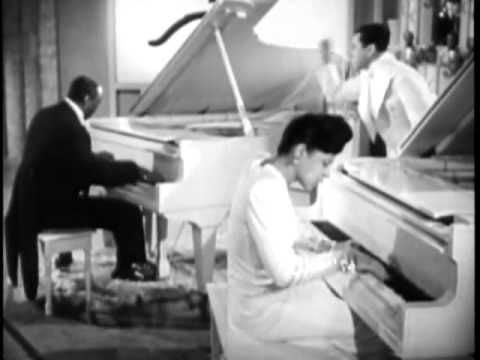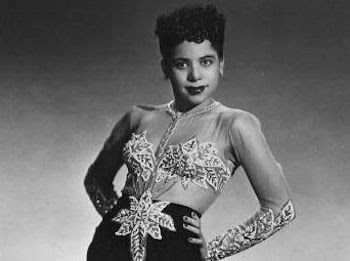
SOUND PROJECTIONS
AN ONLINE QUARTERLY MUSIC MAGAZINE
EDITOR: KOFI NATAMBU
FALL, 2022
VOLUME TWELVE NUMBER ONE
SOUND PROJECTIONS
AN ONLINE QUARTERLY MUSIC MAGAZINE
EDITOR: KOFI NATAMBU
FALL, 2022
VOLUME TWELVE NUMBER ONE
Featuring the Musics and Aesthetic Visions of:
BAIKIDA CARROLL
(September 3-9)
BILLY DRUMMOND
(September 10-16)
BOBBY MCFERRIN
(September 17-23)
ALBERT KING
(September 24-30)
CLORA BRYANT
(October 1-7)
DEAN DIXON
(October 8-14)
DOROTHY DONEGAN
(October 15-21)
BOBBY BLUE BLAND
(October 22-28)
ZENOBIA POWELL PERRY
(October 29-November 4)
CARLOS SIMON
(November 5-11)
VALERIE CAPERS
(November 12-18)
ROLAND HAYES
(November 19-25)
https://www.allmusic.com/artist/dorothy-donegan-mn0000191515/biography
Dorothy Donegan
(1922-1998)
Biography by Scott Yanow
A brilliant virtuoso, Dorothy Donegan constantly switched between boogie-woogie, bop, stride, Art Tatum-style swing, and classical music, sometimes in the same chorus. In concert, she often put together spontaneous medleys of unrelated songs and was never shy to dance while she played. She studied at the Chicago Conservatory and Chicago Music College and made her recording debut in 1942. Donegan made a sensational appearance in the film Sensations of 1945 but never caught on that big despite her remarkable technique. She recorded a lot less than one would expect (six obscure albums during 1954-1963 and nothing during 1964-1974) and was not really that well-known in the jazz world until the mid-'80s. A couple of live Chiaroscuro CDs from 1990-1991 found her in peak form, but she had to be seen to be fully appreciated. She died of cancer on May 19, 1998.
https://www.allaboutjazz.com/musicians/dorothy-donegan
Dorothy Donegan
Dorothy Donegan - piano
More than fifteen years have passed since the flamboyant jazz pianist Dorothy Donegan died. Sadly, few jazz fans, either then or now, are aware of what enormous orchestral capacity she had at the keyboard (1).
Dorothy was born in Chicago in 1924. Heeding her mother’s encouragement, she studied classical music at the Chicago Conservatory and the Chicago Music College. At eighteen, she became the first African-American to be asked to perform at Orchestra Hall in Chicago. The event created enough interest to lead to some work in a film (Sensations of 1945) (2).
At the age of fourteen and studying classical piano she was also beginning her own jazz career, playing for a dollar a night at the city’s South Side bars (1) During a performance at the Hi-Jinx Club one evening, she met up with Art Tatum, who was so impressed with her abilities he became one of her champions. Despite her accomplishments in playing blues and boogie-woogie piano and making a recording for the Bluebird label, her love was for classical music and she hoped to be a classical concert pianist.
Dorothy never forgot her love of classical music so she continued her classical studies at the University of Southern California and taking Master Classes at the University of Maryland when performing in the Washington DC area. Her perseverance in both genre made her an exceptional pianist with a rich harmonic sense (2).
Dorothy’s career spanned over sixty years of performing throughout the U.S. and abroad. The late 1950’s was the period during which she developed her performance style (2). The end result was a flamboyant style that tended to get in the way of her extraordinary piano playing, John. S. Wilson’s coverage of one of her performances sometime later, compared her technical virtuosity to that of Art Tatum (2).
Finding she was more comfortable in a live setting rather than the studio her career was centered on nightclub engagements. As a result she didn’t make many recordings. Scott Albin suggests there is a compilation CD, “Dorothy Romps: A Piano Retrospective (1953-1979) that provides a sample of her many abilities.
To quote Scott Albin: “She was best appreciated live, in lengthy well-attended engagements at night clubs like the Embers in New York and the London House in Chicago, where she offered kaleidoscopic sets that mixed her singing, dancing, and off-color jokes with piano excursions technically comparable to those of an Art Tatum or a world-class pianist.” Despite all this talent, in jazz circles she is scarcely thought of as a jazz pianist but thought of as a lounge entertainer. This is partly because much of her appeal was based on her visual antics (2).
In the 1990s her talents were once again recognized through her show stopping appearances on Hank O’Neal’s Floating Jazz cruises. Dorothy also lectured and received an honorary doctoral degree from Roosevelt University in 1994. She performed at the White House in 1993 and played her last concert at the Fujitsu Concord Jazz Festival in 1997 (2).
Many fellow musicians found her intimidating, which accounts for her solo performances with just bass and drums (3). To quote Dorothy: “I’ve snowed them (male jazz pianists) all except one (the late Art Tatum). Most of them play like women,” (3).
For an opportunity to hear her talents yourself go to YouTube and listen to
http://www.youtube.com/watch?v=m4de5d5S9lE. http://www.youtube.com/watch?v=3Bhebd9Wbkk.
Dorothy Donegan was married three times and died on May 19, 1998.
References:
1. Ratliff, Ben, Dorothy Donegan, 76, Flamboyant Jazz Pianist. May 22, 1998.
http://www.nytimes.com/1998/05/22/arts/dorothy-donegan-76-flamboyant-jazz-pianist.html Retrieved September 4, 2013.
2. Dobie, Wilma. Dorothy Donegan Did It Her Way: Fans Loved But Critics Belittled. August 20, 1998.
http://www.jajzzhouse.org/gone/lastpost2.php37?edit=920665948. Retrieved September 4, 2013.
3. Albin, Scott. Dorothy Donegan Revisited. March 17, 2009.
http://www.jazz.com/jazz-blog/2009/3/17/dorothy-donegan-revisited
Retrieved September 4, 2013.
https://www.arts.gov/honors/jazz/dorothy-donegan
NATIONAL ENDOWMENT OF THE ARTS
Dorothy Donegan
Blessed with an enormous orchestral capacity at the keyboard, Dorothy Donegan was fluent in several styles of jazz as well as with European classical music. Underrated by some due to her proclivity towards showy flamboyance and her penchant for entertaining an audience, she was nonetheless an exceptional pianist with a rich harmonic sense.
Given her virtuosity, it's no wonder her earliest influence and one of her champions was the peerless master of the piano, Art Tatum. Encouraged by her mother to be a professional musician, Donegan was playing piano for a dollar a night at Chicago's South Side bars when she was only 14. She subsequently attended the Chicago Conservatory, Chicago Music College, and the University of Southern California, where she studied classical piano.
In 1943, Donegan gave a concert at the Orchestra Hall in Chicago, the first African-American performer to do so. This created publicity that led to some work in film (Sensations of 1945) and theater (Star Time). Her playing career was largely centered around nightclub engagements, as Donegan was more comfortable in a live setting than a studio.
In the 1950s, she developed her flamboyant performance style, which at times tended to obscure her extraordinary piano playing, deep sense of swing, and wide-ranging repertoire. She would often spice her performances with uncanny impressions of other pianists and singers, skills that enhanced her abilities as an entertainer.
She spent the bulk of her career performing in trios with bass and drums. Her appearance at the Sheraton Centre Hotel in 1980 broke all previous attendance records. In 1983, she appeared on Marian McPartland's NPR radio program, Piano Jazz. Despite her many years of performing, she didn't appear at the legendary jazz club Village Vanguard in New York City until 1987. The New York Times jazz critic John S. Wilson wrote at the time: "Miss Donegan has never let her show-business surface interfere with her virtuosity or her sensitivity as a pianist. No one since Art Tatum has brought together a flow of running lines, breaks, changes of tempo and key, oblique references and rhythmic intensity as skillfully as Miss Donegan does."
In the early 1990s, her show-stopping appearances on Hank O'Neal's Floating Jazz cruises brought her talents to the attention of another generation of jazz fans. She also lectured at several colleges and universities, including Harvard, Northeastern, and the Manhattan School of Music, and received an honorary doctoral degree from Roosevelt University in 1994. Donegan performed at the White House in 1993 and gave her last major performance at the Fujitsu Concord Jazz Festival in 1997.
Selected Discography:
Dorothy Romps: A Piano Retrospective, Rosetta, 1953-79
Makin' Whoopee, Black & Blue, 1979
The Explosive Dorothy Donegan, Progressive, 1980
Live at the 1990 Floating Jazz Festival, Chiaroscuro, 1990
Live at the Floating Jazz Festival 1992, Chiaroscuro, 1992
#EdSullivan #EdSullivanShow

















